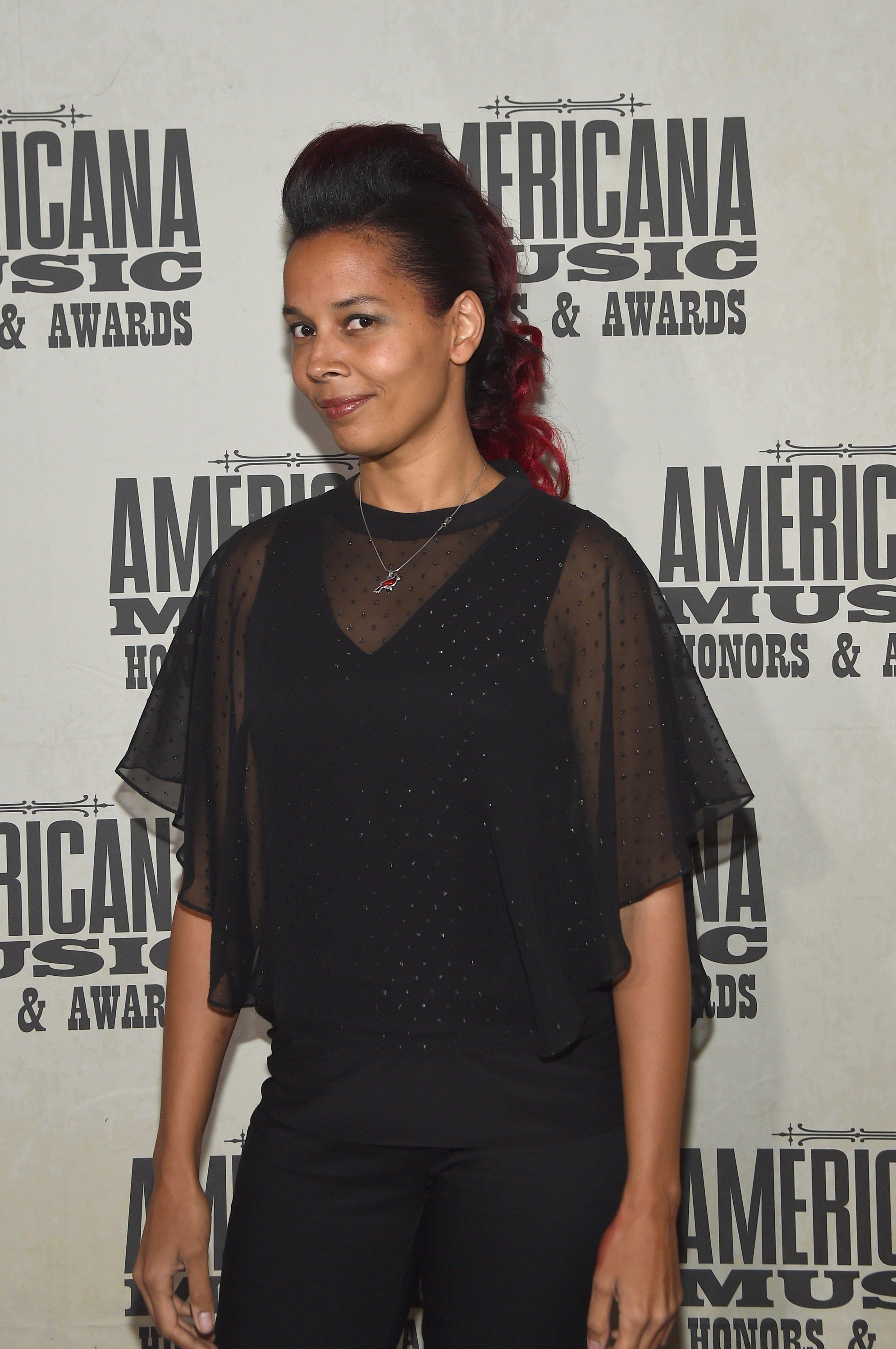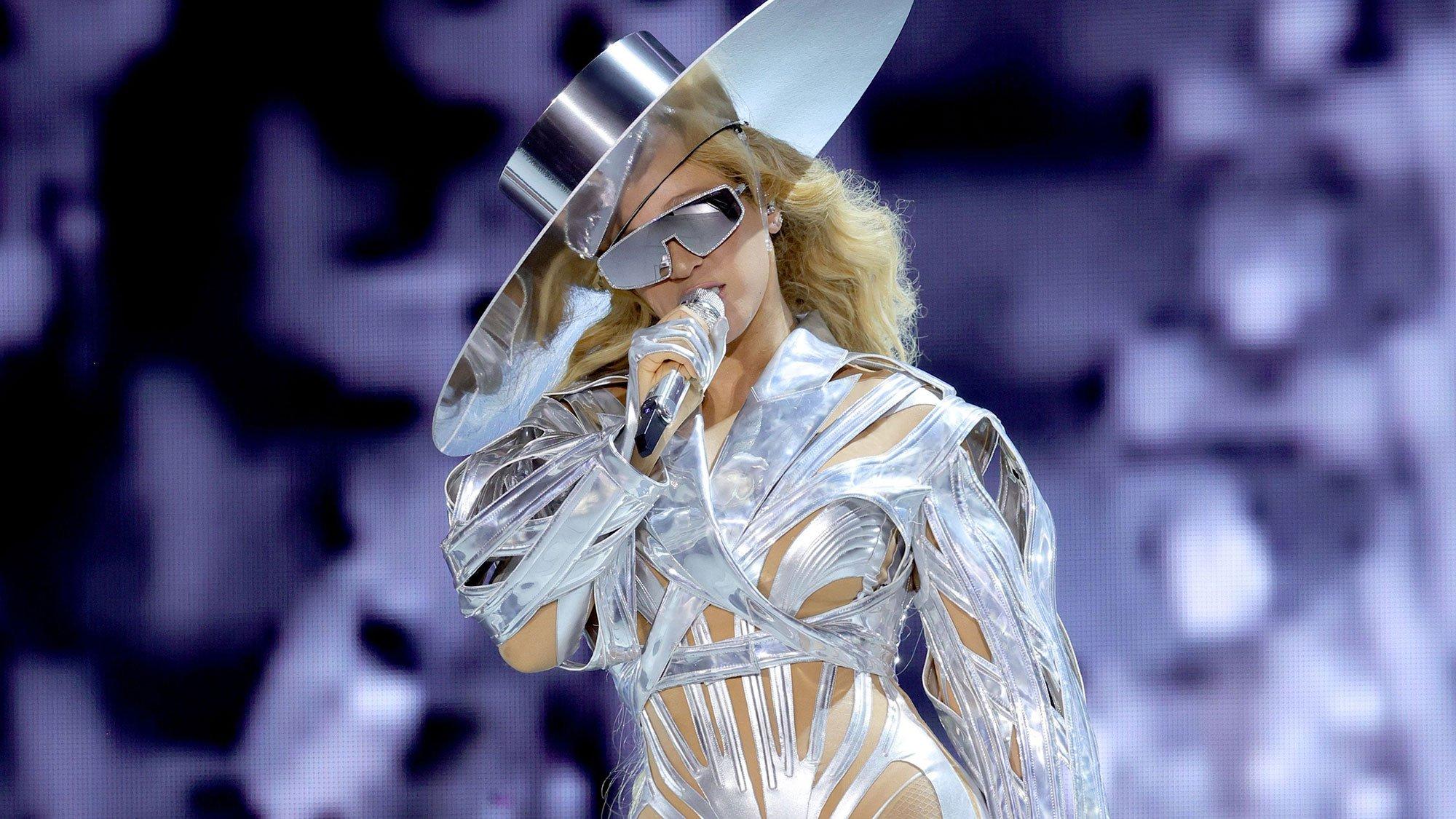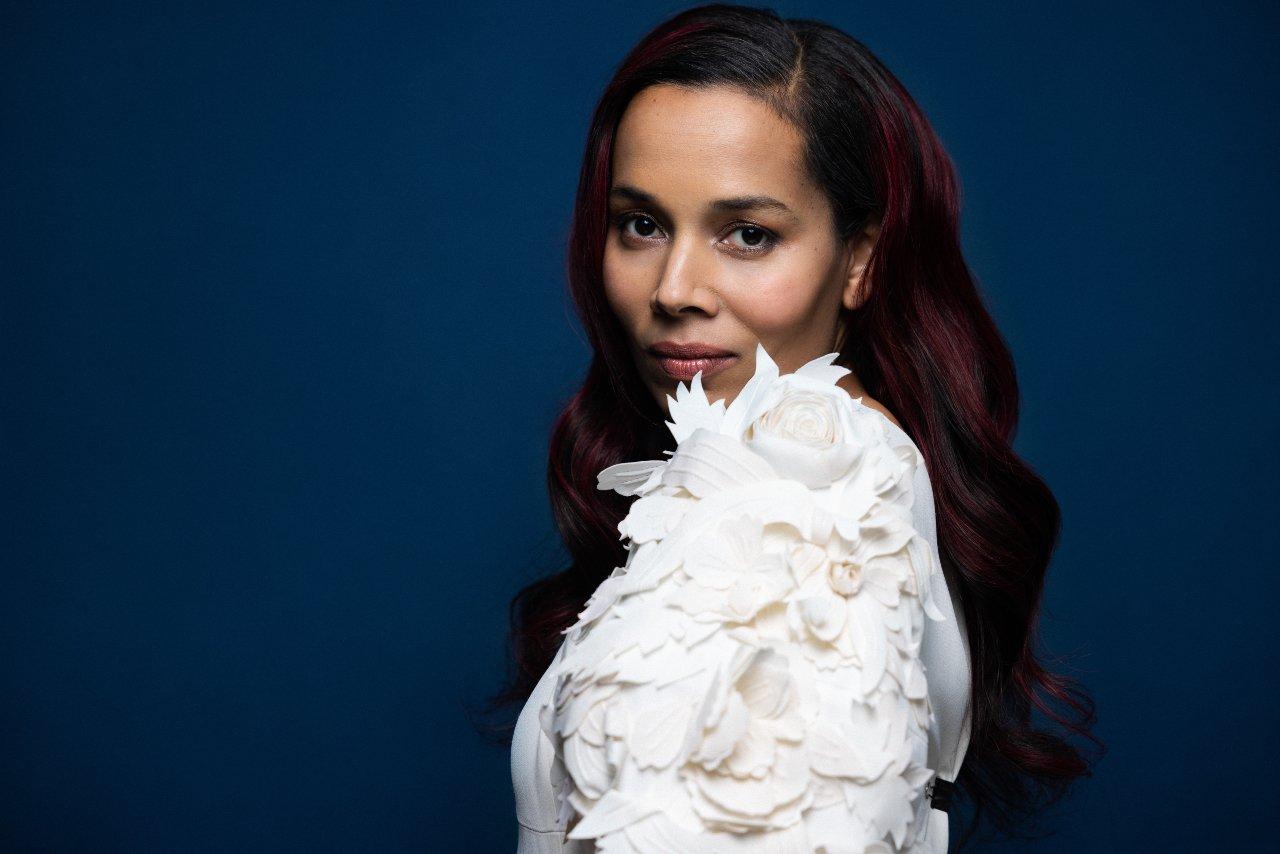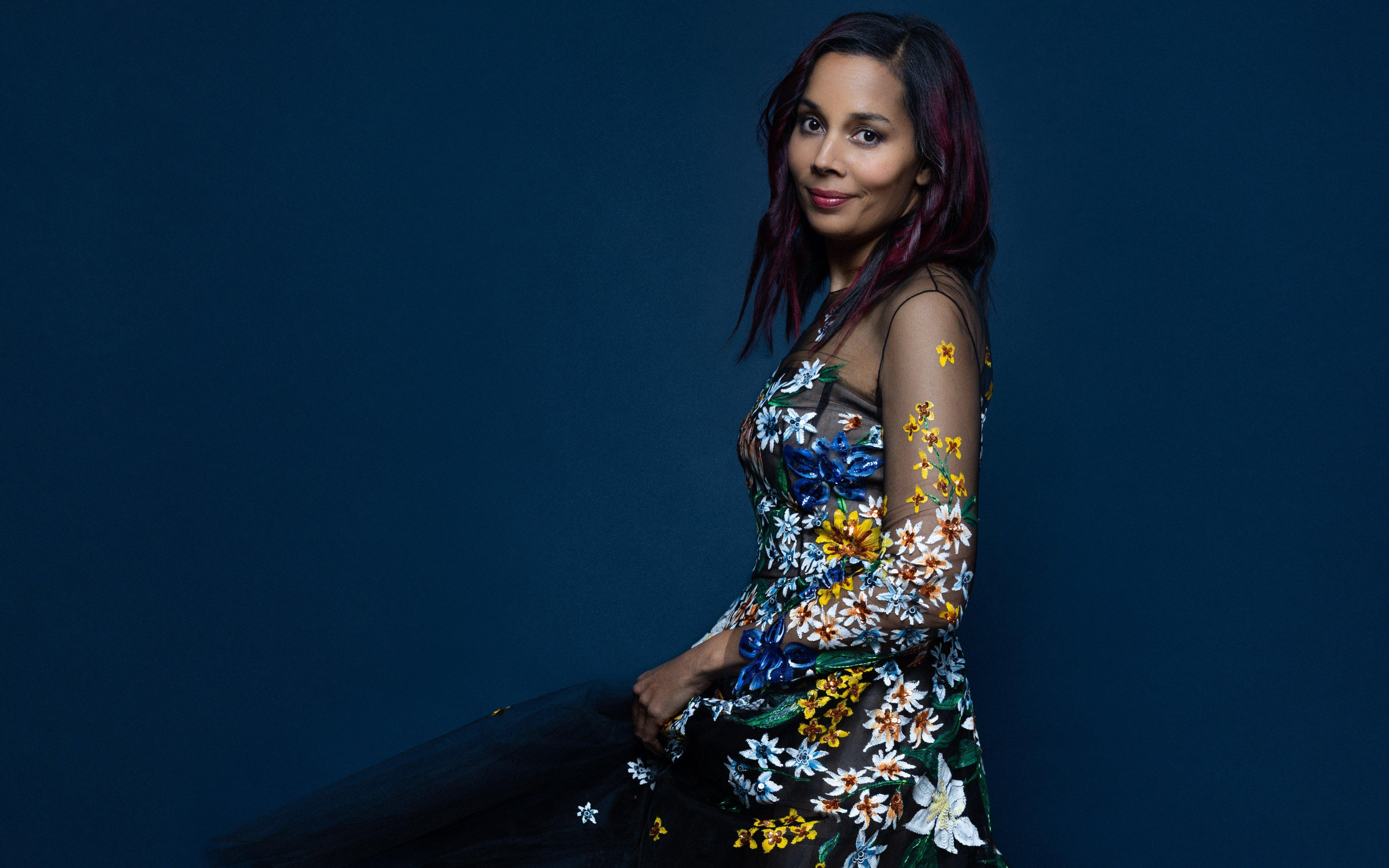At a vibey, wood-paneled listening party in Williamsburg, Rhiannon Giddens felt exposed. Chiefly known as an interpreter and a cultural surveyor — both as a solo artist and for her work with the Carolina Chocolate Drops — the singer had distributed the lyrics to her new album, You're the One.
The assembled were welcoming and supportive; Nonesuch Records president David Bither was there in her corner, and delivered heartfelt remarks at the outset. Still, on a WhatsApp call weeks after, Giddens admitted she felt "awkward as hell." But that's OK, she explains.
"I'm very comfortable doing the things that I've been doing, so it can become a death knell for an artist to be super comfortable," she tells GRAMMY.com. "So I think it was time to step out a little bit and go, 'OK, so this is what happened.'
"But I don't talk about slavery, and I don't talk about civil rights," the two-time GRAMMY winner — and Pulitzer winner — continues. "This is a different way of being, and just as valid."
Giddens is referring to her work in a litany of fields — opera, documentary, ballet, podcasting, and more. Therein, she's aimed to plumb "difficult and unknown chapters of American history" through musical lenses, like the evolution of the banjo from Africa to Appalachia.
Out Aug. 18, You're the One is more eye-to-eye than Giddens' other works; she sings in first person, and deals in themes of romance and devotion, as with the glowing and companionable title track.
There's also a razzing kiss-off ("If You Don't Know How Sweet It Is") — and a brooding, socially conscious moment in the form of "Another Wasted Life," about the suicide of Kalief Browder at Riker's Island.
But despite these more direct expressions, Giddens hasn't simply pivoted from sociological to confessional; that's a binary that can be put to bed.
I'm drawing a little bit more from my experience, but I had to draw from my experience to write other people's stories," she says. "There's emotions that I feel that I then translate into these other stories, so I don't think this record is completely different from that [mode of expression]."
In that way, You're the One isn't a left turn for Giddens; it's another branch on her evermore sprawling tree. Read on for an interview with the singer-now-songwriter about how it came to be, her recent team-ups with Paul Simon and much more.
This interview has been edited for clarity.
At the Brooklyn listening party, was it vulnerable to reveal your songwriting side?
Totally. I felt like I was awkward as hell. I'm very comfortable talking about other people's stories, and that's what I've been drawn to my whole career as an interpreter.
Even as a songwriter, I am inspired by historical stories and wanting to write them. It's one of the reasons why I'm doing this, because the job of the artist is to always grow.
Yeah, it does feel vulnerable. Because it's like, I don't really like talking about myself. It's not like these are all Taylor Swift-type "ripped from my soul and my experience" songs.
But obviously, to write any song you have to pull on experiences, and whatever you do with them — whether you exaggerate them or change them — you're still pulling on yourself more. So, it's been interesting.
What kicked you into gear to do this? To express how you feel, rather than tell other people's stories?
Well, it doesn't express how I feel, though. This is the thing: they're still songs, and it's still a performance.
I'd say I'm drawing a little bit more from my experience, but I had to draw from my experience to write other people's stories. There's emotions that I feel that I then translate into these other stories, so I don't think this record is completely different from that.
There's a couple that are responses to experiences in my life, and then there's a bunch where I'm playing with styles and I'm playing with strong women's voices, and I'm playing with being inspired by all of these artists that have come before me.
So, it's kind of a mixture of these things.
You're right. There doesn't have to a be a binary between diaristic and impersonal.
Yeah, totally.
And I do feel like I'm a more old-fashioned songwriter in that way — in that I really love form and I really love words, and I really love wordplay, and I really love taking an idea and really kind of running with it rather than more of a personal response to something that happened in my life.
I guess "You're the One" is probably the closest to that. That, I wrote purely out of this feeling that I had when I had my son. And I'd had really bad postpartum depression with my daughter, which kind of puts a curtain in between you and your emotions. It's really tough to get through that.
So when I had another kid and I didn't have that and I felt all of that joy — for both of my children. Obviously, I love them the same.
But I recognized that feeling more after the birth of my son because I recognized, Oh, this is what happens when you don't have postpartum depression. That's amazing. And I felt all of that. But that's probably the only one that's a pure response.
I love how universally applicable it is.
You can do "You're the One" at a wedding. It doesn't necessarily say, You're a baby.
That's what I think is really interesting about songs; as long as the emotion is pure, that forms the core of it. It can then represent so many different things, depending on how it's written. I love those stories of a song: somebody writes it because of x, and then everybody thinks it's because of y.
What else is sourced from your personal experience?
"If You Don't Know How Sweet It Is" started as a poem when I was kind of teed off at somebody who kind of left my music or whatever. It was a professional relationship that went south, and I kind of went, "Man, you don't know how good it is," and I just kind of wrote this little piece.
Then, I turned it into a marriage song, turned it into more of a Dolly Parton kind of [song] — this is a moment where this woman is fed up with this husband who has taken her for granted.
So, there's a bunch of [those songs], where I kind of take these emotions that may or may not be really represented. [Any given song] may have come from situations that may or may not be represented in what the final song is.
Tell me how you wanted You're the One to impact people on an aural level.
I was sitting on all these songs that I've written over the last 14 years and haven't had a home. I knew this was my chance to explore other soundworlds. I knew these songs needed more than a banjo, a fiddle and a frame drum. They needed more contemporary sounds.
So, we reached out. My manager suggested Jack Splash, and I knew that he had done Valerie June — and of course, she's in the club; I've known her for a long time. I was like, Well, if he worked with her, he's probably going to have an idea of what to do with me.
I met with him, and I was very quickly like, "Look, I really want you to be creative and I want you to bring your whole box of sounds, but I also want to bring my sounds." I didn't want to say Hey, put all your production on these and whatever. I wanted it to be a mixture of my sounds and his sounds — his musicians and my musicians.
So we did a real old-fashioned recording session where we had everybody there the whole time. It was like six days. "You Louisiana Man" was the first one we did, and that one was like 11 people on the floor, I think, at the same time recording. It was amazing.
I brought my folks, he had his folks, and it was a real beautiful mixture of styles and vibes. I think it's unique. You can't really place it. It's got some retro feel, it's got some modern feel, it's got some old-timey feeling sounds, and that's what I wanted.
That's the platonic ideal, right? The music being made together, in real time.
That's what I think. That's what I like.
Now, I know that there's a type of music that you make that's basically the engineer, the producer's making it, you know what I mean? And the different musicians, like he's the conductor. And that's fine. And it's not to pooh-pooh that, but it's not the way I want to make music.
I was kind of like, "Take my advance. I don't care if I make any money from this. I need us to put the money towards having the bodies in the space."
Because when we're bringing together all these varied things — electric bass, and drums, and organ, and congas, and accordion, and fiddle, and Congolese acoustic guitar — overdubs are not going to work. It's just going to be Jack's sound with a little bit of me on top, or a little bit of accordion or synths or something.
I was like, "That's boring. Can we not do that?" I really wanted us to find a sound that we couldn't have found any other way than being in the room.
Most know you via your interrogations of the history of American music, and your explorations of these wonderful instruments. Where are you at currently with this subject?
The more that I investigate, the more I'm just like: it's so complicated. And the real story is always more interesting than the one that we're fed, but it's always more complicated.
It's multicultural. That's what I'm finding: when you bring people together who want to listen to each other, you find new forms of music. That's just the facts. So, it's the genre thing. I'm going to continue to fight against it.
People always ask me, What is it that I play? And I'm like, "You tell me because I don't care." You know what I mean? "Put whatever box you need to put me in to sell my s—, but I'm not going to self-identify outside of American acoustic music. That's what I do."
I think we look at the wrong categories. I'd rather know: is the music highly produced and electric or is it acoustic? Is the music slow or is it fast? Is the music for dancing or is it songs that don't have a particular dance beat? Is the music based on riffs or is it [not]?
What does R&B mean? What does rock mean? That changes every five minutes, and it doesn't tell anything about what the music actually is. And if it does, it puts it in a box and you may not listen to it because you think what it is.
So I get why they do it, but I just think it's really destructive to innovation and what American music really stands for, which is mixture.
Another person who's very interested in exploring the intricacies of American music is Jason Isbell. Can you talk about working with him on "Yet to Be"?
It was a lot of fun. I wish I could have been there when he did it. I Zoomed in.
He's just so great. And look, we have one of these 21st-century Twitter relationships. We comment on each other's Twitter sometimes. And I have watched him, from afar, be an amazing advocate, a very smart musician and social media person.
I love the way that he interacts with his fans. I love how he's supported Black women musicians, and putting his money where his mouth is. And I just love the way that he moves in the world.
So it just seemed like a really natural fit to get him to sing on this song, and he just knocked it out of the park. It was really, really great.
What do you want You're the One to be a bridge to in your musical life?
I'm just excited to do what I do. I feel very lucky. I get to make the music I want to make with the people that I want to make it with.
I'm not famous. I have a nice-sized, very committed following. I can put on tours and pay my musicians what I should pay them, and earn a living. I just want to keep doing that, and telling stories, and raising other people up, and using my platform for the things that matter to me.
So if this record can bring me to audiences that maybe wouldn't have given me a second listen, that'd be amazing. Maybe it doesn't. Maybe nobody cares. I just make the songs and see where they go and just keep going with that.
I'm looking to have a really good time on tour with my wonderful musician friends and just keep doing the do. It's a rough world out there right now. So I'm just trying to use my time in front of people for as good of things as I can. So, that's what I got.
I've got to ask about Paul Simon. I'm a devotee. You've sang with him in the recent past, including "Homeward Bound: A GRAMMY Salute to the Songs of Paul Simon."
I didn't really realize how much of a soundtrack his music has been of my life until I was waiting to go on and listening to all the songs going, Oh my god, I know all of these. He's such an amazing songwriter. And working with him for "American Tune" is just one of the highlights of my life.
Not just because it's Paul Simon. I mean, yeah, he's an amazing musician, but the experience that we had working together on that, him changing those words for me to sing it and me kind of taking this song in and going, Wow, this is exactly how I feel right now. It's exactly how people that I know feel, and he wrote it before I was born.
And I think for him to see another artist of a different generation making it her own right in front of his face, [it's impactful], you know what I mean? I cried during the dress rehearsal. I was just feeling it. So that was a really powerful experience and I will always treasure it.
It was unexpected. It came at the last minute. I respect him a lot for being willing to do it. And as I like to say to people, nobody has the monopoly on doing the right thing and on wanting to comment on what's going on right now.
And yeah, he's an old white guy, but dang, he didn't have to do nothing but sit back and collect his checks. He made a statement with that song, and I don't want to take that away from him. I didn't change those words; he changed those words.
I remember seeing you perform "American Tune" together at Newport Folk 2022. He said something to the effect of, "This will have more resonance if Rhiannon sings with me."
The thing is the words that he changed, particularly the line about the Mayflower. Originally, it was like, "We came here on the Mayflower." And then he changed it to, "We didn't come here on the Mayflower.
99 percent of the people who live in America don't have ancestors that came on the Mayflower. You know what I mean? It's not just about Black people, it's not just about me. It opens up that song for everybody. And I think that that's really important, because we need to come together in any way that we can. It's an incredible song.
I became the focal point for that, obviously, because I was singing the song. But it is never really about me. I don't really like focusing on What does it mean for me to do it? it really gives that song a whole new life for anybody else who wants to sing it.
I think that's really powerful, and I'm just glad that he was open to doing it. And that we got a chance to not just do it once — but twice.
15 Essential Tracks By Paul Simon: "The Sound of Silence," "The Boxer," "Bridge Over Troubled Water," & More








